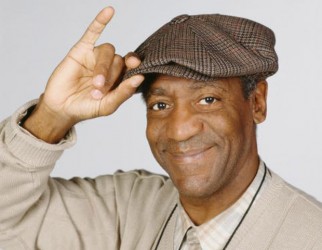LOS ANGELES, (Reuters) – In this new year, Bill Cosby offers an encouraging tale to late bloomers operating several notches below their potential.

There he was in 1960 in a remedial English class in college, where he had entered in his twenties with a total 500 SAT exam score (out of a possible 1,600), wrestling with two composition assignments. He resolved to write about yanking his tooth out as a boy and procrastinating on a paper by sharpening his pencil over and over, down to the eraser.
Cosby got A’s for the stories (and lesser grades for the grammar and syntax). More importantly, the compositions unlocked a gift for comedic storytelling and a confidence that launched a prolific career that continues to this day at the age of 76.
“I am feeling that there are thoughts I have about things that are kooky enough, and I know they are kooky because I like them and they are funny,” Cosby recalled in a telephone interview from his Massachusetts home. “I’ve got to do something with these things.”
So he started selling stories to comedians for $25 a pop. Most didn’t think they were funny enough to buy, forcing him to try his hand at his own stand-up act. To this day, he says, “People are getting the full value of the thoughts I have.”
His kooky thoughts on love, marriage and family are the basis for his first TV special in 30 years, “Far From Finished,” which premiered on Comedy Central in November. In a contrast to the cable outlet’s often course, profanity-laced humor, Cosby’s 90-minute routine is free of cursing.
The exposure on Comedy Central has in turn fueled new interest in Cosby’s earlier work. His comedy albums occupied some of the top positions on Amazon’s bestseller CD list during December, including “Wonderfulness” from 1966 and “Why is There Air?” from 1965 along with “Far From Finished.”
Cosby is clearly amused by the fact that his “LPs,” as he calls them, are selling nearly 50 years later.
‘HE’S TALKING ABOUT ME’
Baby Boomers knew Cosby from TV’s 1965-68 hit “I Spy,” in which he was the first African-American to co-star in a dramatic series, though his race never came up in the script. He and co-star Robert Culp were two spies enjoying friendship and watching out for each other.
“I think ‘I Spy,’ still when you look at it, speaks volumes in terms of propaganda for equality,” says Cosby, who won three Emmys for his role as Alexander Scott. “It’s just magnificent.”
Generation X-ers know him best as Cliff Huxtable, the father of an affluent African-American family on the TV comedy “The Cosby Show” that was a top-ranked show for NBC from 1984 to 1992 and made Cosby a very wealthy man. It is credited with accelerating racial tolerance and even paving the way for a black U.S. president.
And the Millennials discovering him today? They laugh, he says, although he suspects they may be wondering before the show, “Is it gonna be hip, hip meaning ‘are you with our time, are you with my time?’”
Cosby believes his appeal to audiences old and new comes down to one thing: They think, in his words, “He’s talking about me.”
“I have had the pleasure of hearing ‘How did you get in my house?’…people aggressively stopping me and saying ‘I am suing you for being in my house without permission,’” Cosby quips.
In “Far From Finished,” Cosby sits in a chair, patiently explaining how women amass all the power in a marriage. But he also plies his trademark physical comedy, from furtive chewing of forbidden cookies to portraying a statue at his proposed Husband Museum in a pose that says “Don’t hit me” to fencing with the invisible “Lady Cosby.” (His wife of 50 years is Camille Cosby).
Apart from his comedy tour, which goes to Texas this weekend, Cosby is also developing a new NBC sitcom with “The Cosby Show” executive producer Tom Werner. He’s not ready to reveal much, though.
“I am not going to be walking through the whole show, but it’s generational. They like to give things titles,” he concedes, mimicking a TV executive voice when he says “It’s generational.”
SWEET TWEETS
Cosby says he has no problem keeping in shape for a 90-minute stand-up routine. But he does give some crucial advice for show nights: “Keep people out of your dressing room.”
Acts today seem to have grown longer than they used to be.
“I don’t remember during my time during the 1960s and 70s anybody doing two hours,” he says. “We had the singer and the comedian. The comedian and the singer. That’s what you did.”





